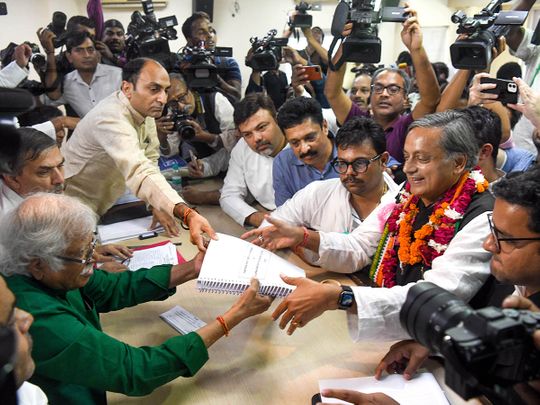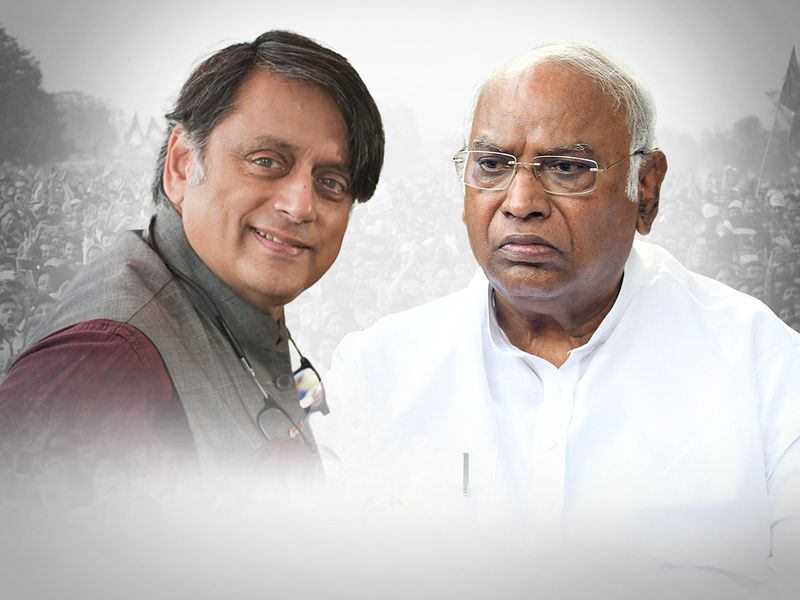
Shashi Tharoor begins his new book, Ambedkar: A Life (Aleph, 2022), with a caveat. “The biography of a man,” observes Tharoor, “who is principally noted for his words rather than his actions inevitably suffers from a deficiency of incidents and a surfeit of ideas.” Could this qualification apply to Tharoor too? Yes.
For he is known much more for his words than his deeds. In fact, the former overshadow the latter to such an extent, sometimes narcissistically so, that one of the over one-score-and-three of Tharoor’s books is actually called Tharoorosaurus (Penguin, 2020).
Small mercies that the vainglorious title wasn’t coined by Tharoor himself. Apparently, it was suggested by Penguin’s publishing head, Meru Gokhale, during a cab ride to the famed Jaipur Literature Festival (JLF), whose co-founder-curator her mother, award winning writer, Namita Gokhale is.
Meru wanted to combine Tharoor’s name with Tyrannosaurus, the ferocious, carnivorous dinosaur genus more commonly known as T-Rex. Because people are frightened by big words, which Tharoor is known to bandy about with cavalier ease from his salad days as a celebrated St. Stephen’s debater, thespian, and College President.
But Shashi, despite his on occasion irritatingly arcane vocabulary is far from being tyrannical or scary. Suave, urbane, personable, witty, and not at all stuck up, Shashi is actually a charmer, as attested to by the bevy of admiring members of the opposite sex of all ages from six to sixty that flock around him wherever he goes.

Surely, his appeal and charisma should not be held against him. Those who know him even slightly affirm that he is actually a nice guy, some would even say too nice — especially for Indian politics.
That is why I would rather prefer, with due apologies to Meru, to consider the title Tharoorosaurus to be a combination of his name and another kind of verbose “dinosaur,” the Thesaurus, of which he is a living example.
To return to his opening caveat, Tharoor adds, “There is undoubtedly drama and suffering in Ambedkar’s life, but far more consequential is the weight of his writings, speeches, and interventions in the public debates of his time.” Even at the risk of being unfair to Ambedkar, we would have to admit that Tharoor’s life has been far from “a curiously bloodless tale.”
I do not refer to his personal life, his three marriages, the last one ending rather tragically with the death of his wife, Sunanda Pushkar.
Rather, to the fact that in addition to being a distinguished author and international civil servant, who even came second in the contest for the post of the United Nations General Secretary in 2006, Tharoor has thrice been elected to the Lok Sabha or the lower house of the Indian parliament from the prestigious Thiruvananthapuram constituency.
Ambedkar, on the other hand, never won a major election in his life. It is another matter, however, that when it comes to the weight of his ideas or his contribution to India’s social transformation, Ambedkar, who also presided over the framing of the Indian Constitution and the Hindu Code Bill, is far ahead of Tharoor.
But comparisons, as they say, are odious — in this case, much more pertinently, neither apposite nor necessary. Tharoor has never hidden his privileges nor sought to turn himself into the broker of backwardness or any other kind of identity politics.
Nehruvian trajectory in Indian politics
He represents, instead, the old-fashioned Nehruvian trajectory in Indian politics — secular, democratic, constitutionist, and even if not economically left, certainly far from right of centre on most issues.
Tharoor, one might say, is someone who even makes the “Khan Market gang,” the pejorative sobriquet for India’s upper class ruling elite, look not so bad.
Indeed, after Dr Manmohan Singh, Tharoor, who is also has doctorate from the Fletcher School of Diplomacy, US, is competence personified, when it comes to the Congress ecosystem. What is more, unlike the former, Tharoor is also a grass roots politician, although from an urban and educated constituency.
This — and much more — makes his candidacy for the presidentship of the Indian National Congress all the more remarkable. Of course, today’s Congress is a far cry from the broad-based, all-India coalition of masses and classes that once led India’s freedom struggle against British imperialism and colonialism.
Instead, it is now a rump of its former self, and except for a few states, routed from most parts of the country where it held almost uninterrupted sway for over 50 of India’s 75 years as an independent country.
Old and the new Congress
But what both the old and the new Congress have in common is that its presidential elections, going back to the days of Mahatma Gandhi, were hardly elections at all. They were mostly selections, in which the winning candidate won unopposed or through compromise, if not consensus.
Given that the electoral rolls of the 9000 Pradesh Congress Committee (PCC) members have not been published, the chances of a free and fair election seem unlikely. Instead, most believe that the candidate who has the Gandhi family’s backing will win. And that is most likely Mallikarjun Kharge, Tharoor’s rival.
The results, to be declared on Oct. 19, even if foregone do not disprove one important fact. Tharoor’s courage to upset the applecart as well as his efforts to bring back inner party democracy to take what still remains India’s principal opposition party out of the clutches of its first family.
His win might galvanise the party to reform if not reinvent itself. Opposition unity moves, which are already afoot although quite unpromising, might also get a boost.
Whatever the outcome, Tharoor’s throwing down the gauntlet and fighting the good fight is sure to have some positive repercussions not only for his party but also for Indian democracy.









